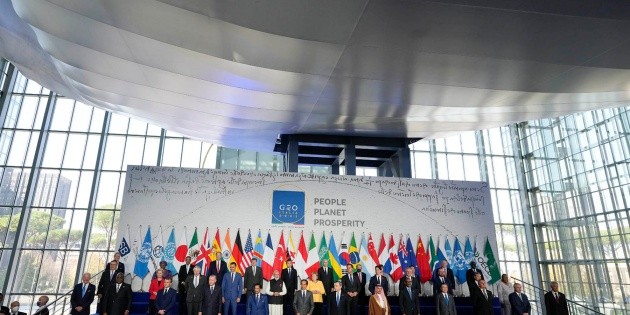The G20 agrees to adopt a global minimum tax of 15%


Photo: AP
The leaders of the Group of Twenty agreed today in Rome to adopt a global minimum corporate tax of at least 15%, as a measure to achieve a more fair tax system and to prevent companies from benefiting from compatible tax systems and not paying taxes in the countries in which they operate, informed sources familiar with the sessions that Held behind closed doors.
According to the sources, the leaders reached this historic agreement after four years of intense discussion, and it is a system based on two pillars, and that addresses the financial challenges posed by the digitization and globalization of the economy.
The mechanism, to be adopted by 2030, follows the path already outlined by the Organization for Economic Co-operation and Development (OECD) for a two-pillar system.
The first establishes that the size of the companies’ residual profit (which remains after the country in which the head office is located has retained the tax corresponding to 10% of profitability) will be distributed among the countries in which the companies operate, and the second establishes a minimum corporate rate of 15% for companies with a size of Its turnover is at least 750 million euros.
On October 8, the Organization for Economic Co-operation and Development reported that 136 countries and jurisdictions, which cover more than 90% of global GDP out of 140 participating in the negotiations, agreed that the figure for Pillar One would be 25% of that residual profit, after even Now it was being discussed between a range of 20-30%.
This refers to large companies with worldwide turnover of more than 20,000 million euros and profitability of more than 10%, and the profits will be distributed among countries where each company generates revenue of more than 1 million euros (250,000 euros in the small case).
The sources pointed out that the agreement guarantees fair, modern and effective tax rules, which are also necessary to encourage investment and growth.
They said the Pillar 1 agreement includes a commitment to abolish taxes on existing digital services and other similar unilateral measures, as well as to refrain from imposing new taxes of the same type in the future, once the new rules are in effect.
In this sense, Italy, Austria, France, the United Kingdom and Spain have agreed to an agreement with the United States on converting taxes on existing digital services to the new international standards.
For its part, the United States has committed to ending the trade sanctions that the United States Trade Representative has adopted against these countries.
In the first session, the leaders also discussed the approval of the new issuance of the Special Drawing Rights by the International Monetary Fund and the innovative mechanism for its reallocation.
The summit began today with a session devoted to the global economy and health, and will conclude tomorrow with a press conference by Italian Prime Minister Mario Draghi, summarizing the agreements reached on issues such as taxes, pandemics, economic recovery and climate change.
The summit was attended by US President Joe Biden. that of France, Emmanuel Macron; Argentina, Alberto Fernandez, and Brazil, Jair Bolsonaro, among other heads of state, as well as the head of the Spanish government, Pedro Sanchez, as permanent guests.

“Future teen idol. Hardcore twitter trailblazer. Infuriatingly humble travel evangelist.”










